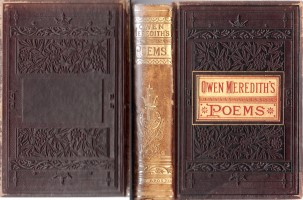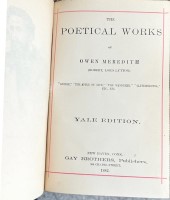PUBLISHER: Gay Brothers, New Haven, New York City, etc., c1865-c1900.
ABOUT: Primarily, if not exclusively, a subscription publisher, Gay Brothers is elusive. The earliest trace so far found with its imprint (Gay Brothers & Co., New York) is a translation of an 1866 German Catholic work; the second, 1872, a History of All Religions of the World (Gay Brothers, New Haven); a large Bible, expanded with illustrations, maps, and other embellishments (Gay Brothers & Co., Providence, R.I., 1874); Joel Dorman Steele A Popular History of Our Country (Gay Brothers & Co., 1876?); and then in the Publishers” Weekly report of an April 1877 Trade Sale “continued, on the supplementary catalogue, … the leading attraction being the general stock of booksellers clearing out. The attendance was small and price low.” Another New Haven bookseller was listed as selling stock for Gay Brothers, New Haven, Connecticut.
Meredith’s Poetical Works (New Haven 1882), labeled on the title page “Yale Edition,” was apparently accompanied by The Poetical Works of William Wordsworth, also so identified. The two books may represent an attempt to satisfy a local need, or perhaps simply to use the cachet of Yale to impress a broader clientele.
WorldCat identifies another 25 titles with the company imprint, among them several works of the prolific and popular historian Benson John Lossing; compilations of Irish poetry and biographies of Irish politicians; and several more Catholic translations, as well as The Practical Home Doctor for Women and Children and Gay’s Illustrated Circle of Knowledge, forming a household library of scientific and useful information (1891). The latest reported title is dated 1897. The City Year Book for the City of New Haven for 1897 also reports the firm’s quarters at 1154 Chapel Street experienced a small fire damaging a gas jet and curtains.
The transcript of the final legal opinion (1884) in a peculiar suit brought against the company gives a sense of its modus operandi. In 1880 it had “entered into a written agreement under the name of Gay Brothers & Co., with the defendant John S. Seibold, whereby he, for certain considerations to be paid to him, agreed to act as clerk and manager of their branch office in the city of Buffalo for the sale of their publications which they were from time to time to consign to him. He was to keep accounts of his stock and of receipts and disbursements of money, and make remittances from time to time of balances, after deducting his commissions, to the plaintiffs. He was to canvass personally for the sale of books each afternoon, and devote the morning of each day to office work until such time as the office work should require his entire time and attention; and he was expected to employ other canvassers to aid him in his work. In the agreement the plaintiffs were described as Gay Brothers & Co., and in that name they executed it." The agreement required Seibold to execute a bond against non-performance, which was put in place to "John Gay and Charles Gay, Jr., doing business of Gay Brothers & Co." (see The American Reports ... by Irving Brown, vol XLIX, San Francisco: Bancroft-Whitney Company, 1885, pp533-537; available on HathiTrust).
Seibold was sent a bunch of books, and sold them, but failed to attend to submit receipts or to attend to his other duties. When the Gays pursued the bond, he in turn filed suit against them, using a quirky New York law intended to control fraud by person purporting to be business partners when no business actually existed, viz., chapter 281 of the Laws of 1833, … as follows: Section 1. “No person shall hereafter transact business in the name of a partner not interested in his firm, and where the designation ‘and Company' or '& Co.' is used, it shall represent an actual partner or partners.” Section 2. “Any person offending against the provision of this act shall, upon conviction thereof, be deemed guilty of a misdemeanor and be punished by a fine not exceeding $1,000.” But Seibold knew in fact that John and Charles were the only partners and both were active in the company. The judge ruled against Seibold.
The title page of Gay’s Series of Standard Histories. First Series (1883) reads “New Haven, Conn. William Gay and Company, successors to Gay Brothers, Gay Brothers & Co., Publishers, 21 Barclay Street, New York, with branches in Philadelphia, Pittsburg, Cleveland, Syracuse, Buffalo, Springfield, MA, Louisville, Chicago, St. Louis, and Cincinnati. There were in fact at least four brothers, Frederick and William as well as John and Charles Jr. It seems impossible at this point to determine who did what, when, and where, but it may be the case that Frederick and William principally saw to contracts for and physical realization of tittles while John and Charles largely oversaw the teams of canvassers, the distribution of books to subscribers, and the collection of income from sales.
:
LUCILE’s ISSUED BY Gay Brothers: The firm's only known edition of Lucile is as the first of several works included in the "Yale Edition" of The Poetical Works of Owen Meredith (1882). :
This edition is one of two titles in this series – the other being The Poetical Works of William Wordsworth, presumably in a matching binding. The electroplates used are those of the most common of four sets known to have been created, and likely the earliest, printed by J. B. Alden (before 1884), Belford Clarke (before 1885), and Crowell (1882 or earlier). Indeed, it is possible Gay Brothers acquired printed sheets from Crowell and had them bound locally: the 1870 and 1875 New Haven directories list the names of 16.


Last revised: 12 February 2023